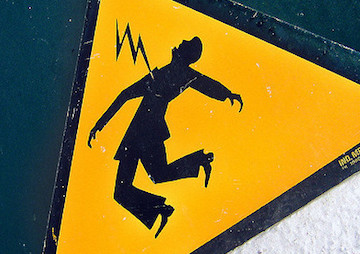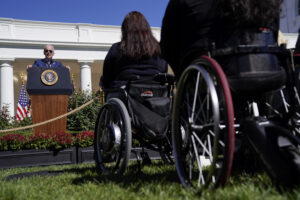FDA Tells Massachusetts Group Home to Stop Shocking Its Disabled Residents
The government questions whether the Judge Rotenberg Center has been straight with families about the risks of its electrical shock devices and alternative treatments. Tomas Fano / (CC BY-SA 2.0)
Tomas Fano / (CC BY-SA 2.0)
By Heather Vogell / ProPublica
This piece originally ran on ProPublica.
Federal officials have moved to ban the controversial electric shock device a Boston-area group home and school has used for decades on its disabled clients.
In a 124-page document proposing the ban, the Food and Drug Administration accused The Judge Rotenberg Center of underreporting adverse effects from the device, using flawed studies to defend its approach, and misleading families about alternative treatments.
“FDA has determined that these devices present an unreasonable and substantial risk of illness or injury that cannot be corrected or eliminated by labeling,” the agency wrote.
The Rotenberg Center is the only place in the country to still employ such a device, which delivers a painful shock to residents’ skin when they engage in undesirable or dangerous behaviors. Currently, 56 of the center’s 251 residents can receive the shocks.
The method has been widely condemned as inhumane. State officials in New York and Massachusetts for years have tried to force the center to abandon using shocks as multiple complaints about them surfaced. In 2014, ProPublica also revealed that New York officials found the center had tied down children with leg and waist straps to punish them
The FDA held a meeting two years ago on the center’s use of electrical stimulation devices on clients with developmental or intellectual disabilities. After the session, the agency went silent. Advocates accused it of failing to act in the face of residents’ suffering.
Then, late last week, the FDA revealed that it was seeking an outright ban on the devices.
The devices can cause both physical and psychological harm, the agency wrote, including risks of pain, burns, tissue damage, depression, fear and aggression. They may even have led a resident to enter a catatonic state, the agency said. The shocks can worsen the symptoms it purportedly treats.
According to New York officials cited in the FDA report, one student subjected to the shocks described living at the center like this: “I am scared and sometimes I feel like my life is in danger. There are days when I am scared to even say a word to anyone. I am afraid to wake up because I never know what is going to happen to me… I get so depressed here I wish my life by fast.”
The center has long argued the shocks keep clients from hurting themselves or others and it reiterated that sentiment in response to the FDA’s proposal. Patients’ families have been among the most outspoken proponents of the approach.
While declining to comment on the proposed ban itself — saying it had not received notification from the FDA — the center said it used the devices only for extremely difficult cases after other therapies had failed.
“The JRC staff is committed to finding the best ways to manage these students’ behaviors to a level where they are no longer causing severe injury and pain to themselves, so that they can learn and spend quality time with their family and friends,” the nonprofit center said in a statement released by a spokesman.
No one age 18 or under is currently eligible to be shocked, the center said.
Some parents of center residents have advocated strongly for the shock method, saying they fear their loved ones could maim themselves or others without it. Some have said the shocks have been the only therapy that has allowed their child to lead a somewhat normal life.
But the FDA questioned the center’s claim that other therapies had been exhausted for all residents subjected to the shocks. Several residents who used to be shocked have since successfully been transitioned to positive-based programs elsewhere, the agency said.
“FDA has reason to believe at least some of these family members were pressured into choosing” shock, the agency wrote, “and FDA questions whether these family members were provided with full and accurate information regarding the risks and benefits of (shock) and alternative treatment options, and whether all other options were adequately attempted.”
In proposing the ban, the FDA inserted itself into a once-heated debate over whether so-called “aversive,” or punishment-based, therapy works.
The agency conceded that the shocks do stop destructive behavior immediately. But it challenged the center’s assertion that the method can have lasting beneficial effects. The FDA said peer-reviewed studies and experts make it clear that aversives have been largely replaced by more effective — and humane — approaches to managing behavior.
While the shocks were once attractive as a “quick fix” for overwhelmed staff in facilities like the center, the FDA wrote, other strategies using positive reinforcement have emerged that are more effective and carry little to no risks. Positive strategies, however, do require special training for staff.
The FDA also brushed aside dozens of studies the center has cited to support its approach. The agency criticized the studies as poorly designed and tainted by conflicts of interest. The FDA said it could find no randomized controlled trials — the gold standard for scientific research — that studied the use of shocks to treat self-injury or aggression.
While the center says it treats the “most difficult behaviorally involved students in the country,” the FDA said it “has found no basis to believe that the patients on whom (shocks) are used at JRC are patients with the most severe” self-injury and aggression. An estimated 25,000 people nationwide have severe behavior problems like those seen at the center, the agency said. Hundreds of thousands more have moderate levels.
The agency is seeking public comments on the proposed ban through May 25. It did not give a date for when the ban could go into effect.
The FDA said that if the proposal was adopted, the agency would allow the center to gradually transition clients off the devices. However, the center could be subjected to enforcement action by the FDA if it did not comply with the new rules. Forcing the center to abandon the devices could end up increasing the cost of treatment for residents who had been on them, the FDA acknowledged.
The action would be only the third time the FDA has sought to ban a medical device. The agency banned prosthetic hair fibers in 1983 and, last month, sought to ban powdered surgeon’s gloves because the powder can cause complications.
ProPublica is a Pulitzer Prize-winning investigative newsroom.
Your support is crucial…With an uncertain future and a new administration casting doubt on press freedoms, the danger is clear: The truth is at risk.
Now is the time to give. Your tax-deductible support allows us to dig deeper, delivering fearless investigative reporting and analysis that exposes what’s really happening — without compromise.
Stand with our courageous journalists. Donate today to protect a free press, uphold democracy and unearth untold stories.






You need to be a supporter to comment.
There are currently no responses to this article.
Be the first to respond.